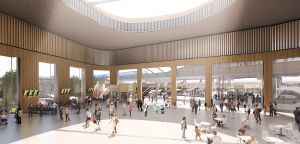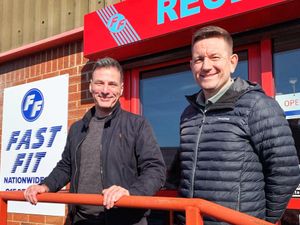New vision for Birmingham International Station as part of £286m revamp
New images show how Birmingham International Station could look after a £286 million revamp to link up with the new HS2 railway line.
They have been drawn up after a £9.27 million boost was secured for the design process that will help turn the station into a fully-integrated transport exchange linked to the new HS2 Interchange Station in Solihull.
The Urban Growth Company (UGC) – set up by Solihull Council secure maximum benefit from HS2’s arrival – secured the Devolution Deal funding from the West Midlands Combined Authority (WMCA) at its investment board meeting earlier this week.
The funding will allow the UGC to appoint consultants to move forward with the technical design of the station, and design and build contractors to undertake the physical delivery of the project.

The UGC’s plan is to transform the existing station into a multi-modal transport exchange bringing together existing rail, future high speed rail, air, trams, buses, rapid transit, private vehicles, taxis, bicycles and an automated people mover, through seamless connections to Birmingham Airport and the HS2 Interchange Station by 2025.
The plans form a major part of the ambitions for the UK Central Hub which is the area of land in Solihull near the M42 comprising Birmingham Airport, the NEC, Jaguar Land Rover, Birmingham Business Park and Arden Cross, which will be home to the HS2 Interchange Station from 2026.
The UGC has predicted that The Hub has the potential to create up to 77,500 new jobs, 775,000 sq m of commercial space, 4,000 new homes and £4.1bn GVA each year.
Nick Brown, chairman of the Urban Growth Company, said: “This project is strategically important because of its role in unlocking major growth and development, as well as improving accessibility and connectivity.
“It also means that Birmingham International Station, which is set to become one of the busiest stations in the UK, will become an iconic gateway to the region with greater capacity and a much-improved passenger experience.”
Anne Brereton, director of managed growth at Solihull Council, said: “The creation of this transport exchange will improve connectivity between some of the key employment zones across the West Midlands, providing better access to jobs and services. It’s also a sustainable plan because of its focus on improving public transport, rather than relying on private vehicles.”
Kathryn James, managing director for conventions and exhibitions at NEC Group, said: “The connectivity of our site is a major draw for the seven million visitors and guests attending the NEC, the Genting Arena and Birmingham Resorts World each year. We’re hugely supportive of a revitalised Birmingham International Station as our region experiences record levels of growth. NEC Group is playing a key part here.
“This summer, the first Bear Grylls Adventure opens on our site – a £20million attraction from Merlin Entertainments offering activities such as the highest free-roam high ropes in Europe. Construction begins shortly on a new campus-based hotel – The Moxy – and our investment in high-tech digital screens further demonstrates our commitment to creating fresh and vibrant destinations.”
The estimated cost of the entire Birmingham International Station project is £286m and the UGC sats it is working with regional and central government to secure funding to deliver the project by December 2025.





